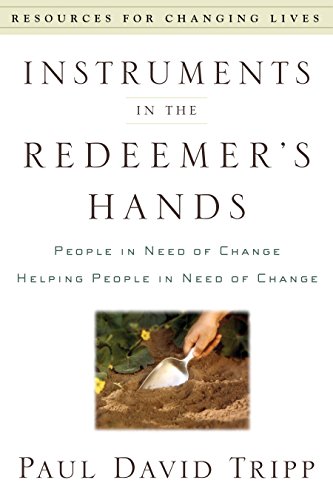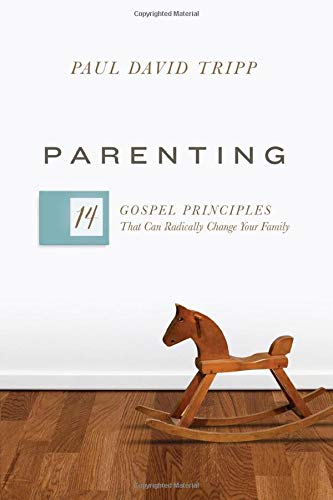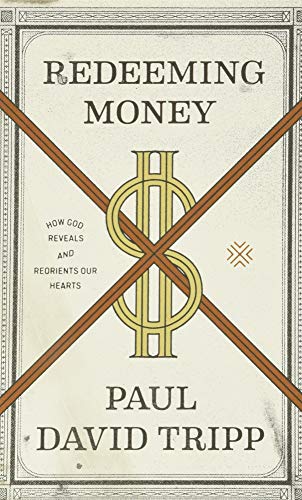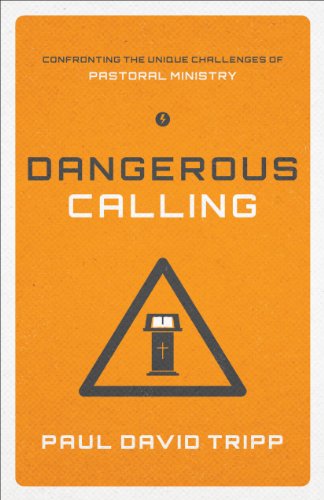
Quotes by Paul David Tripp
You are parenting a worshiper, so it’s important to remember that what rules your child’s heart will control his behavior.
Fourteen Christian Principles of Parenting. Desiring God Website, You Don’t Need More Parenting Advice, https://www.desiringgod.org/articles/you-dont-need-more-parenting-advice
The foolishness inside your children is more dangerous to them than the temptation outside of them.
Fourteen Christian Principles of Parenting. Desiring God Website, You Don’t Need More Parenting Advice, https://www.desiringgod.org/articles/you-dont-need-more-parenting-advice
One of the foundational heart issues in the life of every child is authority. Teaching and modeling the protective beauty of authority is one of the foundations of good parenting.
Fourteen Christian Principles of Parenting. Desiring God Website, You Don’t Need More Parenting Advice, https://www.desiringgod.org/articles/you-dont-need-more-parenting-advice
You must be committed as a parent to long-view parenting because change is a process and not an event. Even the world’s best teacher – Jesus – had a process mentality and, because He did, He was willing to leave His work to unfinished people (see John 16:12–15).
Fourteen Christian Principles of Parenting. Desiring God Website, You Don’t Need More Parenting Advice, https://www.desiringgod.org/articles/you-dont-need-more-parenting-advice
Recognizing what you are unable to do is essential to good parenting. God has tasked parents with many things, but nowhere in His word has He tasked you with the responsibility to create heart change.
Fourteen Christian Principles of Parenting. Desiring God Website, You Don’t Need More Parenting Advice, https://www.desiringgod.org/articles/you-dont-need-more-parenting-advice
Your children need God’s law, but you cannot ask the law to do what only grace can accomplish.
Fourteen Christian Principles of Parenting. Desiring God Website, You Don’t Need More Parenting Advice, https://www.desiringgod.org/articles/you-dont-need-more-parenting-advice
The best pastor is always the one who is willing to sit under his own teaching.
Forward in When Sinners say, “I Do,” Dave Harvey, Shepherd Press, 2007, p. 12, Used by Permission.
Your ears listen for what your heart craves.
A desire for a good thing becomes a desire for a bad thing when that desire becomes a ruling thing.
All creation is meant to be a finger pointing us to ultimate glory, the only glory that can ever satisfy the human heart, the glory of God.
Big Theological Brains and Heart Disease, by Paul David Tripp taken from Dangerous Calling by Paul David Tripp copyright 2012, Crossway Books, a division of Good News Publishers, Wheaton Illinois 60187, www.crosswaybooks.org, p. 49.
If Christ is the head of His body – and He is – then everything else is just body. The most influential pastor or ministry leader is a member of the body of Christ and therefore needs what the other members of the body need. There is no indication in the New Testament that the pastor is the exception to the rule.
Joints and Ligaments by Paul David Tripp taken from Dangerous Calling by Paul David Tripp, copyright 2012, Crossway Books, a division of Good News Publishers, Wheaton Illinois 60187, www.crosswaybooks.org, p. 70.
If you are not feeding your soul on the realities of the presence, promises, and provisions of Christ, you will ask the people, situations, and things around you to be the messiah that they can never be. If you are not attaching your identity to the unshakable love of your Savior, you will ask the things in your life to be your Savior, and it will never happen. If you are not requiring yourself to get your deepest sense of well-being vertically, you will shop for it horizontally, and you will always come up empty. If you are not resting in the one true gospel, preaching it to yourself over and over again, you will look to another gospel to meet the needs of your unsettled heart.
Again and Again by Paul David Tripp taken from Dangerous Calling by Paul David Tripp copyright 2012, Crossway Books, a division of Good News Publishers, Wheaton Illinois 60187, www.crosswaybooks.org, p. 36.
One thing that make the sermon compelling is that the preacher is worshiping his way through his own sermon.
Again and Again by Paul David Tripp taken from Dangerous Calling by Paul David Tripp copyright 2012, Crossway Books, a division of Good News Publishers, Wheaton Illinois 60187, www.crosswaybooks.org, p. 35.
The success of a ministry is always more a picture of who God is than a statement about who the people are that He is using for His purpose.
Headed for Disaster by Paul David Tripp taken from Dangerous Calling by Paul David Tripp copyright 2012, Crossway Books, a division of Good News Publishers, Wheaton Illinois 60187, www.crosswaybooks.org, p. 28.
There is a huge difference between knowledge and wisdom. Knowledge is an accurate understanding of truth. Wisdom is understanding and living in light of how that truth applies to the situations and relationships of your daily life. Knowledge is an exercise of your brain. Wisdom is the commitment of your heart that leads to transformation of your life.
Headed for Disaster by Paul David Tripp taken from Dangerous Calling by Paul David Tripp copyright 2012, Crossway Books, a division of Good News Publishers, Wheaton Illinois 60187, www.crosswaybooks.org, p. 26.
Sin is a moral problem. It is about my rebellion against God and my quest to have for myself the glory that is due Him. Sin is not first about the breaking of an abstract set of rules. Sin is first and foremost about breaking relationship with God, and because I have broken this relationship, it is then easy and natural to rebel against God’s rules.
Headed for Disaster by Paul David Tripp taken from Dangerous Calling by Paul David Tripp copyright 2012, Crossway Books, a division of Good News Publishers, Wheaton Illinois 60187, www.crosswaybooks.org, p. 26.
[Pastors] develop habits that are spiritually dangerous. They are content with a devotional life that either doesn’t exist or is constantly kidnapped by preparation. They are comfortable with living outside of or above the body of Christ. They are quick to minister but not very open to being ministered to. They have long since quit seeing themselves with accuracy and so tend not to receive well the loving confrontation of others. And they tend to carry this unique-category home with them and are less than humble and patient with their families.
Headed for Disaster by Paul David Tripp taken from Dangerous Calling by Paul David Tripp copyright 2012, Crossway Books, a division of Good News Publishers, Wheaton Illinois 60187, www.crosswaybooks.org, p. 23.
It is only the fear of God that has the spiritual power to overwhelm all the horizontal fears that can capture your heart. These relational-situational-location fears are only ever put in their proper place and given their appropriate size by a greater fear – fear of the Lord. Perhaps this is a good portion of what is being said in Proverbs when it declares that “fear of the Lord is the beginning of wisdom” (9:10).
Dirty Secrets by Paul David Tripp taken from Dangerous Calling by Paul David Tripp copyright 2012, Crossway Books, a division of Good News Publishers, Wheaton Illinois 60187, www.crosswaybooks.org, p. 129.
You have been called to speak into the confusion with gospel clarity and authority. You have been called to give glory-bound hope to those who have become hopeless. You are called to speak liberating truths to those who have become deceived. You have been called to plead with disloyal children to once again be reconciled to their heavenly Father. You have been called to give glorious motivation to those who have given up. You have been called to shine the light of the glory of God into hearts that have been made dark by looking for life in all the wrong places. You have been called to offer the filling glories of grace to those who are empty and malnourished. You have been called to represent a glorious King, who alone is able to rescue, heal, redeem, transform, forgive, deliver, and satisfy. You have been called.
Mediocrity by Paul David Tripp taken from Dangerous Calling by Paul David Tripp copyright 2012, Crossway Books, a division of Good News Publishers, Wheaton Illinois 60187, www.crosswaybooks.org, p. 141.
Mediocrity is not a time, personnel, resource, or location problem. Mediocrity is a heart problem. We have lost our commitment to the highest levels of excellence because we have lost our awe. Awe amnesia is the open door that admits mediocrity. Awe of God is fear-producing, inspiring, motivating, convicting and commitment producing. There is no replacement for this.
Mediocrity by Paul David Tripp taken from Dangerous Calling by Paul David Tripp copyright 2012, Crossway Books, a division of Good News Publishers, Wheaton Illinois 60187, www.crosswaybooks.org, p. 141.
I am not discounting the Holy Spirit’s power to capture, convict, and change people through His Word. We are always utterly dependent on Him, and we are never called to do His work. But the Holy Spirit has commissioned us, and our job is to do everything we can to be sharp instruments in His redemptive hands.
Mediocrity by Paul David Tripp taken from Dangerous Calling by Paul David Tripp copyright 2012, Crossway Books, a division of Good News Publishers, Wheaton Illinois 60187, www.crosswaybooks.org, p. 149.
We must always, always remember that the theology of the Word of God is not an end in itself but a means to an end, and that end is a radically grace-transformed life.
Mediocrity by Paul David Tripp taken from Dangerous Calling by Paul David Trip copyright 2012, Crossway Books, a division of Good News Publishers, Wheaton Illinois 60187, www.crosswaybooks.org, p. 147.
Preaching is more than the regurgitation of your favorite exegetical commentary, or a rather transparent recast of the sermons of your favorite preachers, or a reshaping of notes from one of your favorite seminary classes. It is bringing the transforming truths of the gospel of Jesus Christ from a passage that has been properly understood, cogently and practically applied, and delivered with the engaging tenderness and passion of a person who has been broken and restored by the very truths he stands up to communicate. You simply cannot do that without proper preparation, meditation, confession, and worship.
Mediocrity by Paul David Tripp taken from Dangerous Calling by Paul David Trip copyright 2012, Crossway Books, a division of Good News Publishers, Wheaton Illinois 60187, www.crosswaybooks.org, p. 145.
The book of Proverbs is, in ways, a treatise on talk. I would summarize it this way: words give life; words bring death – you choose. What does this mean? It means you have never spoken a neutral word in your life. Your words have direction to them. If your words are moving in the life direction, they will be words of encouragement, hope, love, peace, unity, instruction, wisdom, and correction. But if your words are moving in a death direction, they will be words of anger, malice, slander, jealousy, gossip, division, contempt, racism, violence, judgment, and condemnation. Your words have direction to them. When you hear the word talk you ought to hear something that is high and holy and significant and important. May God help us never to look at talk as something that doesn’t matter.
The Power of Words and the Wonder of God, edited by John Piper and Justin Taylor, Crossway, 2009, p. 24.
In the family, life is brought not only to our doorstep, but into our kitchens, bedrooms, and dens. In the family, life is happening all around us, and it begs to be questioned, evaluated, interpreted, and discussed. There is no more consistent, pregnant, dynamic forum for instruction about life than the family, because that is exactly what God designed the family to be, a learning community.
For [those] who have not been required to confess that it is easier to learn theology then live it, it is tempting to think maturity is more a matter of knowing than a matter of living. They think that godliness is more a matter of what you intellectually grasp than a matter of how you live your life.
Big Theological Brains and Heart Disease, by Paul David Tripp taken from Dangerous Calling by Paul David Tripp copyright 2012, Crossway Books, a division of Good News Publishers, Wheaton Illinois 60187, www.crosswaybooks.org, p. 54.
We must remember that our suffering is not in the way of God’s plan, but part of it. In our suffering, God is not only with us but also is employing it to change us and those to whom we minister.
So, What Now? by Paul David Tripp taken from Dangerous Calling by Paul David Tripp, copyright 2012, Crossway Books, a division of Good News Publishers, Wheaton Illinois 60187, www.crosswaybooks.org, p. 221
You are called to be public and influential ambassador of a glorious King, but you must resist the desire to be a king. You are called to trumpet God’s glory, but you must never take that glory for yourself. You are called to a position of leadership, influence, and prominence, but, in that position you are called to “humble yourself under the mighty hand of God.
So, Now What? by Paul David Tripp taken from Dangerous Calling by Paul David Tripp, copyright 2012, Crossway Books, a division of Good News Publishers, Wheaton Illinois 60187, www.crosswaybooks.org, p. 214.
Pastor, you will never be that perfect portrait; the only one who achieved that perfection was Christ. No, rather than being a perfect portrait that assures people that the gospel is true, you and I are called to be windows through which people look and see the glory of the risen Lord Jesus Christ. It is our weakness that demonstrates both the essentiality and power of the grace of the Lord Jesus Christ.
Separation by Paul David Tripp taken from Dangerous Calling by Paul David Tripp, copyright 2012, Crossway Books, a division of Good News Publishers, Wheaton Illinois 60187, www.crosswaybooks.org, p. 207.
Pastor, there is no congregation you need to preach to more than yourself.
Separation by Paul David Tripp taken from Dangerous Calling by Paul David Tripp, copyright 2012, Crossway Books, a division of Good News Publishers, Wheaton Illinois 60187, www.crosswaybooks.org, p. 203.
Public ministry is meant to be fueled and propelled by private devotion.
Always Preparing by Paul David Tripp taken from Dangerous Calling by Paul David Tripp, copyright 2012, Crossway Books, a division of Good News Publishers, Wheaton Illinois 60187, www.crosswaybooks.org, p. 197.
You must think of yourself not only as an instrument of the work but also as a recipient. Your work as an instrument does not cancel out your identity as a recipient, and your identity as a recipient doesn’t weaken your work as an instrument. You and I must never approach grace only as instruments of that grace in the lives of others; we must also remember that there is no grace that we offer to others that we don’t at once need ourselves.
Always Preparing by Paul David Tripp taken from Dangerous Calling by Paul David Tripp, copyright 2012, Crossway Books, a division of Good News Publishers, Wheaton Illinois 60187, www.crosswaybooks.org, p. 193-194.
If you are ever going to be an ambassador in the hands of a God of glorious and powerful grace, you must die. You must die to your plans for your own life. You must die to your self-focused dreams of success. You must die to your demands for comfort and ease. You must die to your individual definition of the good life. You must die to your demands for pleasure, acclaim, prominence, and respect. You must die to your desire to be in control. You must die to your hope for independent righteousness. You must die to your plans for others. You must die to your cravings for a certain lifestyle or that particular location. You must die to your own kingship. You must die to the pursuit of your own glory in order to take up the cause of the glory of Another. You must die to your control over your own time. You must die to your maintenance of your own reputation. You must die to having the final answer and getting your own way. You must die to your unfaltering confidence in you. You must die.
Always Preparing by Paul David Tripp taken from Dangerous Calling by Paul David Tripp, copyright 2012, Crossway Books, a division of Good News Publishers, Wheaton Illinois 60187, www.crosswaybooks.org, p. 189-190.
Proud people tend to talk about themselves a lot. Proud people tend to like their opinions more than the opinions of others. Proud people think their stories are more interesting and engaging than others. Proud people think they know and understand more than others’. Proud people think they’ve earned the right to be heard. Proud people think they have glory to offer. Proud people, because they are basically proud of what they know and of what they’ve done, talk a lot about both. Proud people don’t reference weakness. Proud people don’t talk about failure. Proud people don’t confess sin. So proud people are better at putting the spotlight on themselves than at shining the light of their stories and opinions on God’s glorious and utterly undeserved grace.
Self-Glory by Paul David Tripp taken from Dangerous Calling by Paul David Tripp, copyright 2012, Crossway Books, a division of Good News Publishers, Wheaton Illinois 60187, www.crosswaybooks.org, p. 175-176.
Biblical literacy is not to be confused with Christian maturity. Homiletic accuracy is not the same as godliness. Theological dexterity is very different from practical holiness. Successful leadership is not the same as a heart for Christ. Growth in influence must not be confused with growth in grace.
War Zones by Paul David Tripp taken from Dangerous Calling by Paul David Tripp, copyright 2012, Crossway Books, a division of Good News Publishers, Wheaton Illinois 60187, www.crosswaybooks.org, p. 105.
The biggest protection against the kingdom of self is not a set of self-reformative defensive strategies. It’s a heart that’s so blown away by the right-here, right-now glories of the grace of Jesus Christ that you’re not easily seduced by the lesser temporary glories of that claustrophobic kingdom of one, the kingdom of self.
War Zones by Paul David Tripp taken from Dangerous Calling by Paul David Tripp, copyright 2012, Crossway Books, a division of Good News Publishers, Wheaton Illinois 60187, www.crosswaybooks.org, p. 102.
There is no one we run to defend more than we do ourselves.
Joints and Ligaments by Paul David Tripp taken from Dangerous Calling by Paul David Tripp, copyright 2012, Crossway Books, a division of Good News Publishers, Wheaton Illinois 60187, www.crosswaybooks.org, p. 77.
The pastor must be enthralled by, in awe of – can I say it: in love with – his Redeemer so that everything he thinks, desires, chooses, decides, says, and does is propelled by love for Christ and the security of rest in the love of Christ. He must be regularly exposed, humbled, assured, and given rest by the grace of his Redeemer. His heart needs to be tenderized day after day by his communion with Christ so that he becomes a tender, loving, patient, forgiving, encouraging, and giving servant leader. His meditation on Christ – His presence, His promises, and His provisions – must not be overwhelmed by his meditation on how to make his ministry work.
More than Knowledge and Skill by Paul David Tripp taken from Dangerous Calling by Paul David Tripp, copyright 2012, Crossway Books, a division of Good News Publishers, Wheaton Illinois 60187, www.crosswaybooks.org, p. 63.
No one gives grace better than the person who is deeply persuaded that he needs it himself. Self-righteous people tend to be critical, dismissive, and impatient with others.
Big Theological Brains and Heart Disease, by Paul David Tripp taken from Dangerous Calling by Paul David Tripp copyright 2012, Crossway Books, a division of Good News Publishers, Wheaton Illinois 60187, www.crosswaybooks.org, p. 55.
When the word of God, faithfully taught by the people of God and empowered by the Spirit of God, falls down, people become different… The ultimate purpose of the Word of God is not theological information but heart and life transformation. Biblical literacy and theological expertise are not, therefore, the end of the Word of God but a God-ordained means to an end, and the end is a radically transformed life because the worship at the center of that life has been reclaimed.
Big Theological Brains and Heart Disease, by Paul David Tripp taken from Dangerous Calling by Paul David Tripp copyright 2012, Crossway Books, a division of Good News Publishers, Wheaton Illinois 60187, www.crosswaybooks.org, p. 51.
Hope for the Christian is a confident expectation of a guaranteed result.
There is hope for the Christian because in our foolishness wisdom has come, it our weakness power has come, in our alienation love has come and in our brokenness peace has come. Get up and believe there is hope.
The Coming of the Prince of Peace is a promise that everything that is damaged by sin will be restored.
Waiting confronts us at the deepest level that we are not in charge.
The anger of man and the anger of God takes Jesus to the cross.
Listening takes sacrifice, it takes humility and it takes the rescue of your heart from yourself.
You are not in a holding pattern waiting for eternity. This life has meaning and purpose. There is a kingdom you have been called to be a part of. It’s called the Kingdom of God and God wants you you to invest in His kingdom.
Belief is not simply a function of the brain. No, it’s an investment of the heart that fundamentally changes the way that you live.
When you’re in the intersection between the promises of God and the details of your situation, what you do with your mind is very important. In this intersection, God will never ask you to deny reality. Abraham did not deny reality. Romans 4 says that he “considered the deadness of Sarah’s womb.” Faith doesn’t deny reality. No, it is a God-focused way of considering reality.
Dirty Secrets by Paul David Tripp taken from Dangerous Calling by Paul David Tripp copyright 2012, Crossway Books, a division of Good News Publishers, Wheaton Illinois 60187, www.crosswaybooks.org, p. 133.
Autonomous Christianity never works, because our spiritual life was designed by God to be a community project.
Again and Again, by Paul David Tripp taken from Dangerous Calling by Paul David Tripp copyright 2012, Crossway Books, a division of Good News Publishers, Wheaton Illinois 60187, www.crosswaybooks.org, p. 39.
Children will serve and worship God, or they will serve and worship something else. You cannot divide children into two groups, those who worship and those who do not. Every child is a worshiper. The question is, What does he worship?
Age of Opportunity, P&R Publishing, 1997, p. 43, Used by Permission. Get this book!
Rejection of parental authority is a rejection of God’s authority. And the rejection of God’s authority is, in fact, claiming his authority as my own. It is an attempt to be God. Whether your teenager realizes it or not, the stakes could not be higher!
Age of Opportunity, P&R Publishing, 1997, p. 120, Used by Permission. Get this book!
The goal of parenting is not to retain tight-fisted control over our children in an attempt to guarantee their safety and our sanity. Only God is able to exercise that kind of control. The goal is to be used of Him to instill in our children an ever-maturing self-control through principles of the Word and to allow them to exercise ever-widening circles of choice, control, and independence.
Age of Opportunity, P&R Publishing, 1997, p. 37-38, Used by Permission. Get this book!
The goal of parenting is to work ourselves out of a job. The goal of parenting is to raise children who were once totally dependent on us to be independent, mature people who, with reliance on God and proper connectedness to the Christian community, are able to stand on their own two feet.
Age of Opportunity, P&R Publishing, 1997, p. 36-37, Used by Permission. Get this book!
Six characteristics of biblical conviction:
1. A biblical conviction is always based on a study of, submission to and application of Scripture.
2. A biblical conviction is always predetermined
3. A biblical conviction will not change with the circumstances.
4. Biblical convictions are inflexible.
5. True biblical conviction is bold.
6. True biblical conviction is always lived out.
Age of Opportunity, P&R Publishing, 1997, p. 132-133, Used by Permission. Get this book!
Too often, what we call convictions are actually preferences. Real convictions are based on revealed truth (that is, Scripture). Preferences are based on personal desire. Convictions are constant; preferences change with desire. Convictions demand faith; preferences rely on the emotions of the moment.
Age of Opportunity, P&R Publishing, 1997, p. 131-132, Used by Permission. Get this book!
To fear God means that my life is structured by a sense of awe, worship, and obedience that flows out of recognizing Him and His glory. He becomes the single most important reference point for all that I desire, think, do, and say. God is my motive and God is my goal. The fear of God is meant to be the central organizing force in my life.
Age of Opportunity, P&R Publishing, 1997, p. 217, Used by Permission. Get this book!
What is this fear of God? It is the nonnegotiable motivator of the spiritual person. God, His presence, His will, and His glory are the reason the spiritual person does what he does. He has a single motivation in his life – to live so as to please his Lord. He does not live for his own pleasure or the pleasure of others. He does not live for what he can possess. He does what he does because God is and has spoken. This is the sole guidance system for his existence. He does what he does not because someone is watching, or out of fear of the consequences, but ultimately because of a deep, worshipful love and reverence for God. The thought of knowingly and purposefully disobeying Him is unthinkable.
Age of Opportunity, P&R Publishing, 1997, p. 118-119, Used by Permission. Get this book!
We are called by God to do theology, that is, to live our lives with a moment-by-moment consciousness of God.
Age of Opportunity, P&R Publishing, 1997, p. 54-55, Used by Permission. Get this book!
Rather than seeking to get our teenagers under our control, we want to be used of God so they would joyfully submit to His.
Age of Opportunity, P&R Publishing, 1997, p. 227, Used by Permission. Get this book!
Human legalism leads to human self-righteousness. Human self-righteousness denies the need for the saving, enabling grace of Christ. Human righteousness embraces the cruelest of Satan’s lies, that a person can be righteous by keeping the law. If that were true, there would have been no need for the birth, life, death, and resurrection of Christ.
Age of Opportunity, P&R Publishing, 1997, p. 83, Used by Permission. Get this book!
Remember, it is not your weakness that will get in the way of God’s working through you, but your delusions of strength. His strength is made perfect in our weakness! Point to His strength by being willing to admit your weakness.
Age of Opportunity, P&R Publishing, 1997, p. 189, Used by Permission. Get this book!
Spiritual warfare makes us think of demon possession, horrific demonstrations of satanic control, and dramatic exorcisms. But Scripture presents spiritual warfare not as the violent, bizarre end of the Christian life, but as what the Christian life is!
Age of Opportunity, P&R Publishing, 1997, p. 116. Get this book!
We have found it important not to enter the family worship time with rigid expectations and a rigid plan. We want an atmosphere of freedom, where our teenagers feel free to ask questions, verbalize doubts, express confusion, debate applications, and try to draw inferences and applications, all without the fear of being silenced, rebuked, or ridiculed. We want the truth to connect, to convict, and to capture our teenagers, so we are in no hurry. We want to give them time to understand and the Spirit time to work. This time is for them. We have no expectations about the amount of material we cover and our goal is not to get our teenagers to agree with us. The goal is to stimulate in them a hunger for God, so we want to be relaxed, patient, and creative.
Age of Opportunity, P&R Publishing, 1997, p. 186, Used by Permission. Get this book!
There are desires that make the teenager susceptible to the temptation to rebel: The desire to be an individual and think for oneself, the desire for freedom, the desire to try new things, the desire to test the boundaries, the desire for control, the desire to make one’s own decisions, the desire to be different, the desire to fit in, and the desire to be accepted. These, with a host of other desires, all fueled by the autonomy and self-centeredness of the sin nature, can surely lead the teenager astray.
Age of Opportunity, P&R Publishing, 1997, p. 25-26, Used by Permission. Get this book!
In times of struggle and failure, we need to do more than pronounce judgment on what’s wrong and enforce punishment. We need to talk, discuss, question, evaluate, engage, and interact with our teenagers, hoping that God will use these moments of opportunity to open their eyes a little more to who they really are and to their constant need for Christ.
Age of Opportunity, P&R Publishing, 1997, p. 124, Used by Permission. Get this book!
The rules and regulations approach that focuses on keeping the teenager “out of trouble” will ultimately fail because it does not deal with the heart. As Paul so powerfully states, it “lacks any value for restraining sensual indulgence.” What he means is that it does not deal with the source of a person’s wrong behavior, the sinful desires of the heart. Peter says that the corruption in the world is caused by evil desires (2 Peter 1:4). We have to work at the level of the heart desires with our teenagers, or we will win lots of battles and ultimately lose the war. It’s not enough to be detectives, jailers, and judges. We must pastor the hearts of our children with the kind of faithful, watchful care for their souls that we receive from our heavenly Father.
Age of Opportunity, P&R Publishing, 1997, p. 111, Used by Permission. Get this book!
Sin plays havoc with our spiritual vision. Although we are able to see the sin of others with specificity and clarity, we tend to be blind to our own. And the most dangerous aspect of this already dangerous condition is that spiritually blind people tend to be blind to their blindness.
Again and Again by Paul David Tripp taken from Dangerous Calling by Paul David Tripp copyright 2012, Crossway Books, a division of Good News Publishers, Wheaton Illinois 60187, www.crosswaybooks.org, p. 34.
If my heart is the source of my sin problem, then lasting change must always travel through the pathway of my heart. It is not enough to alter my behavior or to change my circumstances. Christ transforms people by radically changing their hearts. If the heart doesn’t change, the person’s words and behavior may change temporarily because of an external pressure or incentive. But when the pressure or incentive is removed, the change will disappear.
There is never a moment in ministry when you aren’t being ministered to. The Savior is not just working through you in the lives of others, but He is also working in you as He works through you. He is not just calling you to be an agent of His transforming grace; He is transforming you by the same grace. He is not just committed to the success of your ministry but also to the triumph of His grace in your own heart and life… You are never just a vehicle of His amazing grace. No, you are always also a recipient of that grace.
So, What Now? by Paul David Tripp taken from Dangerous Calling by Paul David Tripp, copyright 2012, Crossway Books, a division of Good News Publishers, Wheaton Illinois 60187, www.crosswaybooks.org, p. 223.
Think about the insanity of…ministry idolatry. The people in your congregation did not become active participants in your ministry so that collectively they could make you feel better about yourself and more secure with your ministry gifts. God didn’t call you to your particular ministry position so that you could finally cobble together an identity that you could live with. The leadership of the church didn’t call you to be their pastor because they knew that you needed a forum where you could find meaning and purpose. The troubled people in your congregation did not come with their troubles so that you could feel needed, essential, and appreciated. The people who faithfully give don’t give so you can build a successful ministry and bask in the security of your accomplishments. So you will never find in your ministry the rest of heart that every human being seeks. And when you look there, it only ends in anxiety, frustration, hurt, disappointment, anger, and bitterness and may ultimately lead you to question the goodness of God… The only defense against this the gospel of Jesus Christ. It is only when we are living out of the life that grace alone is able to give that we quit seeking life elsewhere. It is only when we are embracing the rest of the forgiveness of grace that we can look at ourselves honestly and grieve without wallowing in debilitating guilt and shame.
Separation by Paul David Tripp taken from Dangerous Calling by Paul David Tripp, copyright 2012, Crossway Books, a division of Good News Publishers, Wheaton Illinois 60187, www.crosswaybooks.org, p. 202-203.
Why do any of us get upset or tense when confronted? Why do any of us activate our inner lawyer and rise to our own defense? Why do any of us turn the tables and remind the other person that we are not the only sinner in the room? Why do we argue about the facts or dispute the other person’s interpretation. We do all of these things because we are convinced in our hearts that we are more righteous that how than we are being portrayed in the moment of confrontation. Proud people don’t welcome loving warning, rebuke, confrontation, question, criticism, or accountability, because they don’t feel the need for it. And when they do fail, they are very good at erecting plausible reasons for what they said or did, given the stress of the situation or relationship in which it was done.
Self-Glory by Paul David Tripp taken from Dangerous Calling by Paul David Tripp, copyright 2012, Crossway Books, a division of Good News Publishers, Wheaton Illinois 60187, www.crosswaybooks.org, p. 178.
Pastoral ministry is always shaped, formed, directed, and driven by worship. Your ministry will be shaped by worship of God or worship of you or, for most of us, a troubling mix of both. Perhaps there is no more powerful, seductive, and deceitful temptation in ministry than self-glory. Perhaps in ministry there is no more potent intoxicant than the praise of men, and there is no more dangerous form of drunkenness than to be drunk with your own glory. It has the power to reduce you to shocking self-righteousness and inapproachability.
Self-Glory by Paul David Tripp taken from Dangerous Calling by Paul David Tripp, copyright 2012, Crossway Books, a division of Good News Publishers, Wheaton Illinois 60187, www.crosswaybooks.org, p. 167.
There is nothing that will put you in your place, nothing that will correct your distorted view of yourself, nothing that will yank you out of your functional arrogance, or nothing that will take the winds out of the sails of your self-righteousness like standing, without defense, before the awesome glory of God.
Familiarity by Paul David Tripp taken from Dangerous Calling by Paul David Tripp, copyright 2012, Crossway Books, a division of Good News Publishers, Wheaton Illinois 60187, www.crosswaybooks.org, p. 121.
The DNA of sin is selfishness. Sin inserts me into the middle of my universe; the one place reserved for God and God alone. Sin reduces my field of concern down to my wants, my needs, and my feelings. Sin really does make it all about me.
War Zones by Paul David Tripp taken from Dangerous Calling by Paul David Tripp, copyright 2012, Crossway Books, a division of Good News Publishers, Wheaton Illinois 60187, www.crosswaybooks.org, p. 98.
What once bothered us doesn’t bother us anymore. What once activated our conscience doesn’t seem to anymore. What we knew was outside of God’s boundaries, and therefore functionally outside of ours, lives inside our boundaries, and it doesn’t matter to us anymore. It is a scary place to be. The hard heart is a stony heart. It is not malleable anymore. It’s hard and resistant to change, no longer tender and responsive to the squeeze of the hands of the Spirit. There is evil in our hearts and in the acts of our hands, and we’re okay with it. Could there be a more dangerous place for a believer to be?
Joints and Ligaments by Paul David Tripp taken from Dangerous Calling by Paul David Tripp, copyright 2012, Crossway Books, a division of Good News Publishers, Wheaton Illinois 60187, www.crosswaybooks.org, p. 72.
Children are worshipers, and their lives are shaped and controlled by whatever they worship. That means that every moment is a God moment. In every moment, a child is accepting his role as a creature and living in worshipful obedience to God, or he is exchanging God for some aspect of the created world he is living to get. Children don’t typically think of themselves this way (nor do their parents!), so they need us to faithfully point out to them the covenantal nature of their actions. There is no more important piece of the Bible’s job description for parents.
Age of Opportunity, P&R Publishing, 1997, p. 44, Used by Permission. Get this book!
You are most loving patient, kind and gracious when you are aware that there is no truth that you could give to another that you don’t desperately need yourself. You are most humble and gentle when you think that the person you are ministering to is more like you than unlike you. When you have inserted yourself into another category that tends to make you think you have arrived, it is very easy to be judgmental and impatient.
Headed for Disaster by Paul David Tripp taken from Dangerous Calling by Paul David Tripp copyright 2012, Crossway Books, a division of Good News Publishers, Wheaton Illinois 60187, www.crosswaybooks.org, p. 23-24.
Fear can overwhelm your senses. It can distort your thinking. It can kidnap your desires. It can capture your meditation so that you spend more time worrying about what could be than considering the God who is. Fear can cause you to make bad decisions in the short term and fail to make good decisions in the long run. Fear can cause you to forget what you know and to lose sight of who you are. Fear can make you wish for control you will never have. It can cause you to distrust people you have reason to trust. It can cause you to be demanding rather than serving. It can cause you to run when you should stay and to stay when you really should run. Fear can make God look small and your circumstance loom large. Fear can make you seek from people what you will only get from the Lord. Fear can be the soil of your deepest questions and your biggest doubts. Your heart was wired to fear, because you were designed for life shaped by fear of God. But horizontal fear cannot be allowed to rule your heart, because if it does, it will destroy you and your ministry.
Dirty Secrets by Paul David Tripp taken from Dangerous Calling by Paul David Tripp copyright 2012, Crossway Books, a division of Good News Publishers, Wheaton Illinois 60187, www.crosswaybooks.org, p. 128.
You see, the standards you set for yourself and your ministry are directly related to your view of God. If you are feeding your soul everyday on the grace and glory of God, if you are in worshipful awe of His wisdom and power, if you are spiritually stunned by His faithfulness and love, and if you are daily motivated by His presence and promises, then you want to do everything you can to capture and display that glory to the people God has placed in your care. It is your job as a pastor to pass this glory down to another generation, and it is impossible for you to do that if you are not being awestricken by God’s glory yourself.
Mediocrity by Paul David Tripp taken from Dangerous Calling by Paul David Tripp copyright 2012, Crossway Books, a division of Good News Publishers, Wheaton Illinois 60187, www.crosswaybooks.org, p. 138.
Excellence is, in fact, a relationship. There is only One is truly and perfectly excellent. He alone is the sum and definition of what excellence is and does. So the one who is excellence, in His grace, came to you when you were in a state of anything but excellence, and by grace offered you the promise of actually becoming a partaker of His divine nature. He then connects you to purposes and goals way higher, way grander and more glorious than you would every have sought for yourself… Your hope of ever being excellent in His eyes and doing what is excellent in His sight is found in your relationship to Him and in His grace that not only forgives and accepts but radically transforms. And He calls and empowers you to display His excellency and the excellency of His grace. It is only this excellency that has the power to free us from the false excellency of human pride and the mediocrity that results when we are okay with ourselves and our world just the way they are.
Mediocrity by Paul David Tripp taken from Dangerous Calling by Paul David Trip copyright 2012, Crossway Books, a division of Good News Publishers, Wheaton Illinois 60187, www.crosswaybooks.org, p. 142-143.
The goal of parenting is to work yourself out of a job. The goal of parenting is to send young adults out into the world who are prepared to live as God’s children and as salt and light in a corrupt and broken world.
Age of Opportunity, P&R Publishing, 1997, p. 192-193, Used by Permission. Get this book!
Sinners want their will to be done, and they will fight with whoever gets in their way. Consequently, sinners are much better at making war then they are at making peace, much better at hatred than they are at love. They are much better at causing division then they are at creating unity.
Age of Opportunity, P&R Publishing, 1997, p. 62, Used by Permission. Get this book!
Human self-righteousness denies the need for the saving, enabling grace of Christ. Human righteousness embraces the cruelest of Satan’s lies, that a person can be righteous by keeping the law. If that were true, there would have been no need for the birth, life, death, and resurrection of Christ.
Age of Opportunity, P&R Publishing, 1997, p. 83, Used by Permission. Get this book!
Recommended Books








